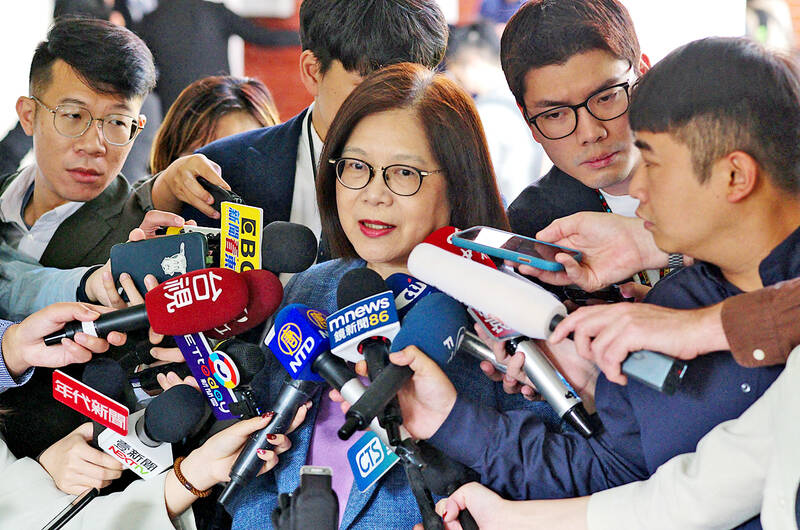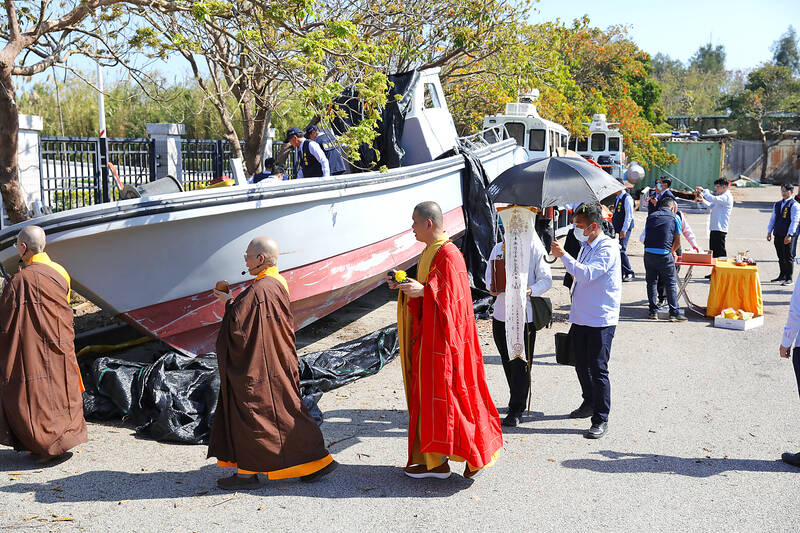Premier Chen Chien-jen (陳建仁) yesterday called for both sides of the Taiwan Strait to approach the security of Kinmen and Xiamen waters with rationality and equitability, following a boat chase that resulted in the death of two Chinese fishers last week.
Chen was responding to media inquiries ahead of a legislative session amid rising cross-strait tensions following the capsizing of a Chinese speedboat off the east coast of Kinmen on Wednesday last week during a pursuit by the Taiwanese coast guard.
The Ministry of National Defense established the boundaries of “prohibited” and “restricted” waters around Kinmen in 1992 to better protect fishers, with relevant law enforcement well understood by both sides, Chen said.

Photo: Sam Yeh, AFP
The government will continue to uphold maritime safety and fishers’ rights, Chen said, urging both parties to prohibit the entry of illegal vessels into these waters through their respective coast guards.
He added that Taiwan has been implementing law and order in compliance with the Act Governing Relations Between the People of the Taiwan Area and the Mainland Area (臺灣地區與大陸地區人民關係條例) in the waters surrounding Kinmen County, less than 10km from China’s Xiamen.
Minister of National Defense Chiu Kuo-cheng (邱國正) yesterday told reporters that such affairs fall under the jurisdiction of the coast guard, and the military would not intervene to prevent matters from escalating.

Photo: CNA
The prohibited zone around the main islands of Kinmen and Little Kinmen, or Lieyu (烈嶼), extends about halfway to the Chinese coast to the north and northeast, up to about 4km to the east and about 8km to the south.
Taipei and Beijing have traded barbs over the legitimacy of the zone after the incident, with the latter announcing that it would enhance its maritime law enforcement capabilities and increase regular patrols in the region.
On Monday, the China Coast Guard boarded a Kinmen sightseeing boat to conduct a surprise inspection.
Ocean Affairs Council Minister Kuan Bi-ling (管碧玲) yesterday called China’s action regrettable and urged Taiwanese ship operators “not to stay where China is attempting inspections, but instead notify the council immediately for assistance.”
At about 9am yesterday, China’s Marine Surveillance No. 8209 ship was intercepted by a coast guard vessel after radar detected it entering restricted waters near Kinmen.
The coast guard told the Chinese ship that it was barred from entering restricted waters without authorization and shadowed it for nearly an hour before it left Kinmen waters.
Meanwhile, family members of the two Chinese men who died in the incident arrived in Kinmen yesterday to hold funeral rituals, while the other two men on the boat were deported back to China.
Although Chinese authorities refused to sign the formal repatriation form, the coast guard said it was a formality and the two men would be sent back regardless.
The six relatives of the deceased, accompanied by a lawyer and officials from the Red Cross and China’s Association for Relations Across the Taiwan Straits, arrived by boat at Shueitou Pier (水頭碼頭) at about 10:30am.
Li Zhaohui (李朝暉), an adviser for the Jinjiang branch of the Chinese Red Cross, told reporters the relatives’ “most basic demand” was to understand how the men had died.
The group first traveled to the Kinmen County Funeral Parlor, where the bodies are being held, before conducting a “spirit summoning” (引魂) ceremony for them at Fuguodun Pier (復國墩碼頭).
From there, they were to go back to the funeral parlor to hold a prayer service before the bodies were cremated, and would return to China after retrieving their funeral urns this morning, said sources with knowledge of the matter who wished to remain anonymous.
Tamkang University Graduate Institute of China Studies associate professor Chang Wu-yueh (張五岳) yesterday said that the Kinmen incident should not escalate cross-strait tensions.
Broadly speaking, neither side has attempted to worsen cross-strait relations over the issue, he said.
In terms of geopolitics, Kinmen has a particular understanding of China due to its proximity, Chang said.
The establishment of pilot areas for encouraging joint interaction for cross-strait development in Xiamen and Kinmen would also mean that the incident would cease to influence cross-strait affairs, he added.
Additional reporting by Chiu Chun-fu and CNA

CHAOS: Iranians took to the streets playing celebratory music after reports of Khamenei’s death on Saturday, while mourners also gathered in Tehran yesterday Iranian Supreme Leader Ayatollah Ali Khamenei was killed in a major attack on Iran launched by Israel and the US, throwing the future of the Islamic republic into doubt and raising the risk of regional instability. Iranian state television and the state-run IRNA news agency announced the 86-year-old’s death early yesterday. US President Donald Trump said it gave Iranians their “greatest chance” to “take back” their country. The announcements came after a joint US and Israeli aerial bombardment that targeted Iranian military and governmental sites. Trump said the “heavy and pinpoint bombing” would continue through the week or as long

TRUST: The KMT said it respected the US’ timing and considerations, and hoped it would continue to honor its commitments to helping Taiwan bolster its defenses and deterrence US President Donald Trump is delaying a multibillion-dollar arms sale to Taiwan to ensure his visit to Beijing is successful, a New York Times report said. The weapons sales package has stalled in the US Department of State, the report said, citing US officials it did not identify. The White House has told agencies not to push forward ahead of Trump’s meeting with Chinese President Xi Jinping (習近平), it said. The two last month held a phone call to discuss trade and geopolitical flashpoints ahead of the summit. Xi raised the Taiwan issue and urged the US to handle arms sales to

BIG SPENDERS: Foreign investors bought the most Taiwan equities since 2005, signaling confidence that an AI boom would continue to benefit chipmakers Taiwan Semiconductor Manufacturing Co’s (TSMC, 台積電) market capitalization swelled to US$2 trillion for the first time following a 4.25 percent rally in its American depositary receipts (ADR) overnight, putting the world’s biggest contract chipmaker sixth on the list of the world’s biggest companies by market capitalization, just behind Amazon.com Inc. The site CompaniesMarketcap.com ranked TSMC ahead of Saudi Aramco and Meta Platforms Inc. The Taiwanese company’s ADRs on Tuesday surged to US$385.75 on the New York Stock Exchange, as strong demand for artificial intelligence (AI) applications led to chip supply constraints and boost revenue growth to record-breaking levels. Each TSMC ADR represents

Pro-democracy media tycoon Jimmy Lai’s (黎智英) fraud conviction and prison sentence were yesterday overturned by a Hong Kong court, in a surprise legal decision that comes soon after Lai was jailed for 20 years on a separate national security charge. Judges Jeremy Poon (潘兆初), Anthea Pang (彭寶琴) and Derek Pang (彭偉昌) said in the judgement that they allowed the appeal from Lai, and another defendant in the case, to proceed, as a lower court judge had “erred.” “The Court of Appeal gave them leave to appeal against their conviction, allowed their appeals, quashed the convictions and set aside the sentences,” the judges